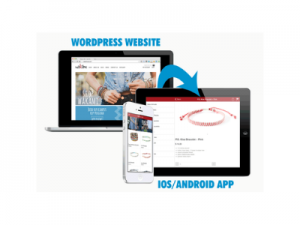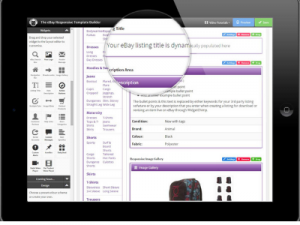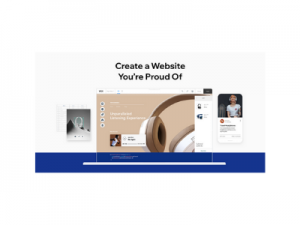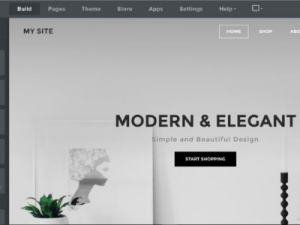Do you want to develop a new website or update an existing website, but you don’t know how to code it?
Ten years ago, to create a professional-looking website, you would’ve had to pay a developer thousands of dollars.
There are a number of great WYSIWYG (aka, what you see is what you get) website builders today that are inexpensive and do not require any knowledge of coding.
We’re sharing 10 excellent site builders in this post that allow you to build your website exactly the way you want it to look.
Choosing the Best Website Builder — What to Look for?
Do we suggest that you write down what you want to do with your website before comparing the top website builders? What your ambitions are and what features on your website you would like to see.
For instance, you can write down items such as: having a blog section, photo gallery, eCommerce online store, reservation system, contact form, SEO features, features of social media, etc.
If you are uncertain of what you want, then for inspiration, check out your rivals or other websites.
To build your new website, most website builders offer an intuitive drag and drop user interface. Before making your final decision, you can take advantage of the trial accounts (free plans) or the generous money-back guarantee to test the drive.
Next, you need to consider your options for growth. Can you apply updates to your website on a daily basis? Do you need a segment for a blog? Will you in the future be selling more items on your website?
As your company expands, you need to make sure that the website designer you select is capable of handling your needs.
Our Best Website Creator Review Criteria
We have helped over 200,000+ users launch a website, and have checked just about every website creator on the market over the last two decades.
When evaluating the best website builder picks for each use-case, we analyze several different parameters, but our top five elements are:
Ease of Use – For beginners, we want to ensure that the website builder is simple to use (non-techy users). It must come with a builder for drag-and-drop, versatile editing tools, and options for customization.
Pricing – We look for which website builder provides the best value for the price because it is a competitive space. We ask questions such as having a free domain, free SSL, free business email, free features of eCommerce, etc. If not, then how much a small business owner will have to spend on additional extra / secret expenses.
Design & Features – We want to ensure that loads of skilled website templates are provided by the website builder and provide flexibility to add other features, such as Google Analytics, third-party marketing software, etc.
Customer Support – Although we expect website builders to have an intuitive interface that is easy to use, we want to ensure that customer service is available 24/7 when necessary.
Data ownership & portability – Beginners often don’t think about this, but being in the industry for over two decades, to ensure that you own your data, we pay extra attention to terms of service, and if you need to switch, it’s portable.
That said, without hiring a developer, let’s take a look at the top website builder platforms to make your website.
What kinds of sites can be created with a website builder?
The great thing about website builders is that they provide templates for a variety of sectors (check out these templates by Wix, for example). You choose the one you want and only add text and photos of your own. You don’t have to start from a blank slate, which makes achieving impressive results in no time super easy.
For small businesses, portfolios, photographers, online stores, restaurants, and hotels, as well as clubs and associations, website builders are perfect.
Sites requiring a database (real-estate listings, job boards), on the other hand, are not so easy to create. They require a different instrument and more time. In this scenario, your best bet: WordPress.
And since we often get this question: No, hyper-complex websites such as Airbnb, eBay, or Facebook are totally out of reach. To build a website like that, you’ll need to hire a development team.
If, specifically, you’re looking to sell digital downloads, then check out this complete guide.
1. WordPress

WordPress.org (also known as self-hosted WordPress) is the most common forum for creating websites in the world. WordPress is operated by over 39 percent of all websites on the internet.
Note: WordPress is available in two versions. WordPress.org and WordPress.com are self-hosted. Later in this post, we will speak about WordPress.com. You can also read our comparison to WordPress.org vs. WordPress.com
Thanks to its success, powerful features, scalability, and ease of use, the self-hosted WordPress tops our list of best website builders.
WordPress is a website builder that is both free and open source. This implies that, relative to any other online website builder in this list, you have full control over your website.
You would need a WordPress hosting account to host your own website, unlike most website builders (this is a lot easier than it sounds).
Pros:
- For every aspect of your website and online presence, WordPress gives you full control. Any kind of website can be created using it. An eCommerce shop, community forums, a social network, a platform for membership, a basic website, a landing page, and more.
- There are thousands of pre-made WordPress themes of high quality that you can use for the design of your website. It also has amazing drag-and-drop page builders like SeedProd, Beaver Builder, and Divi that allow you to use a drag-and-drop editor to easily create your own page layouts.
- WordPress is fully translated into dozens of languages and can easily be used to create websites that are multilingual.
- WordPress is by far the cheapest website creator on the market when you consider all the above advantages.
Cons:
- You’re going to have to run your own website, which means you’re going to need to get acquainted with a new system. Most users quickly conquer this slight learning curve, but in the beginning, it feels a little rough.
- You will also need to keep up with changes to WordPress, updates to the plugin, and build backups.
Pricing:
- Although WordPress is a free website creator, to get your website online, you will need a domain name and web hosting that usually costs $14.99/year and $7.99 per month, respectively.
- Fortunately, for WPBeginner users, we have worked out a special offer. With Bluehost, an official hosting provider recommended by WordPress, you can start a website for only $2.75 per month. They offer 60% off on web hosting for our users with a free SSL certificate, free domain name, great uptime, and 24/7 telephone support.
- WordPress is one of the cheapest website builders on this list for small businesses with this unique pricing.
- See our guide on how to create a website with step-by-step directions for more information.
Also, See Basic WordPress Setup on a VPS Server
2. Constant Contact Website Builder

The website creator for Continuous Interaction is an intelligent A.I. Driven website builder that allows you to create a customized website in minutes. For non-technical small business owners, this is a dream come true.
Pros:
- Constant Communication is recognized for being the world’s leading service for email marketing. They have chosen to create a world-class artificial intelligence-driven website builder after listening to small business concerns, which allows you to create a website in minutes (without writing any HTML code).
- To build a fully custom web design with customized images and content recommendations, you can use their driven ADI (artificial design intelligence), the wizard.
- All design templates are user-friendly, so both desktop and mobile devices can look fantastic on your website.
- It’s an absolutely hassle-free website builder because it’s a hosted website solution. They also offer 24/7 live phone support and chat support for small companies, which is awesome.
- Constant Touch is undoubtedly one of the best professional website builders on this list, which is user-friendly, comes with decent editing software, and SEO features at a great price, considering the features.
Cons:
- At present, the developer ecosystem is limited, so there are no add-ons from third parties that you can install on your website to add new functionality that Constant Communication does not offer.
- If you want to connect a custom domain name, just like any other website creator, then you will have to move to the paid plan. The good thing is that they provide you with many resources and integrations from third parties right on the platform to make your ads more effective at a great price to attract new and existing customers.
Pricing:
- A powerful free website builder that allows you to create a website, blog and even an online store is supported by Constant Touch. You can, at no extra cost, add unlimited web pages.
- You will need to buy their website builder plan, which costs $10 per month (or $8.50 per month if pre-paid annually), to get a domain name, make the website live, and begin selling.
- All plans come with live chat 24/7 and assistance from the phone.
- If you want to integrate email marketing, then you might want to consider their plans for Email Marketing or Email Marketing Plus that come with all the features of the website builder combined with all the advanced marketing automation features.
- For small companies that don’t want to use WordPress, Constant Touch is a perfect alternative.
3. Wix

Another famous website builder program based on the cloud is Wix.com. Combined with a powerful collection of features to quickly construct your website, it offers ease of use.
Pros:
- The developer of the Wix website is a completely hosted network, so hosting won’t have to be paid for. You get access to hundreds of models to pick for the design of your website. Using their intuitive drag and drop site builder, each template is completely editable.
- An artificial design intelligence (Wix ADI) was also developed by Wix that can design a beautiful website for you.
- Wix also comes with hundreds of free and paid applications that you can install on your website, in addition to loads of templates. You can add fresh features and functionality to your website with these applications. Some of them are built by Wix, and others are created by developers from third parties.
- With restricted bandwidth and storage, Wix provides a free plan. You can use this plan, however, to test drive their website builder for drag and drop. It does not include a domain name, so you will want to move to a premium plan if you decide to keep your website.
- With all Wix plans, you also get a free SSL, but for your website, you will need to turn it on.
Cons:
- On your website, Free and Link Domain plans will show Wix branded advertising. To stop those ads, you’ll need to upgrade to their Combo or Unlimited plan.
- If you ever want to move your website away from Wix, it will be very difficult for you to do so.
- Their $9.16 a month Connect Domain plan allows you to connect a custom domain name only, but you’ll still have to purchase a domain name separately.
Pricing:
- With a Wix branded subdomain, Wix provides a restricted free plan. For $9.16 per month, you can link to a domain. Their combo plan begins at $14.95/month and will send you a domain name free of charge. For online retailers, the e-commerce package costs $26.25 a month.
- If you are interested in how WordPress matches up to it, then see our Wix vs WordPress comparison.
4. BigCommerce

BigCommerce is the market’s best website builder for eCommerce. If you’re looking to build a scalable online shop, BigCommerce is the platform for you. It comes with all the important built-in features, so you can keep your overhead low and your margins high.
Pros:
- BigCommerce is a full hosting solution for eCommerce, so you don’t have to worry about speed, protection, or updates to the website. For you, they handle the server and technological side, so you can concentrate on growing your company.
- BigCommerce has native integration with WordPress, unlike other hosted eCommerce solutions, that allows you to leverage WordPress’s flexibility while taking advantage of BigCommerce’s headless eCommerce strength. In simple terms, no matter how much traffic you get, your website will be fast and safe.
- BigCommerce incorporates Stripe (credit cards and ACH), PayPal, Apple Pay, Square, Amazon Pay, Visa Checkout, Chase Pay, Ayden, and more with all common payment gateways. BigCommerce doesn’t charge a processing fee for you to use these payment gateways, unlike Shopify.
- Using their simple drag & drop website builder, you can begin with one of their many pre-made website templates and customize it to meet your needs.
Cons:
- If you’re just getting started, then in the list you’ll find BigCommerce pricing a bit higher than other website builders.
- Migrating away from BigCommerce would be challenging because it’s a proprietary platform.
Pricing:
- For all plans, BigCommerce comes with a 15-day free trial. Their basic plans, which come with all the key features you may need, are $29.95 a month. For additional conversion optimization functionality, you can upgrade to the plus plan that costs $79.95 per month. It costs $249.95 a month for their pro package, which includes all the advanced features you will need.
- In contrast to Shopify and other third-party eCommerce sites, the best thing about BigCommerce is that they have a smooth WordPress integration that can be a massive plus if you want to combine the versatility of WordPress with the strength of BigCommerce.
- This is one of the reasons why in our best website builder list, we have BigCommerce rated as large.
5. Shopify

Another famous eCommerce website builder specifically built for online stores and eCommerce websites is Shopify. With 1 million active users, it powers more than half a million companies. Items worth over $40 trillion have been sold on Shopify’s website.
Pros:
- Shopify is a fully hosted, all-in-one solution, which means you don’t have to worry about handling applications, downloading updates, or maintaining backups. For you, Shopify does all that.
- It provides Shopify Payments, an integrated payment solution that allows you to accept credit cards. To accept payments, you can also add third-party payment gateways.
- Shopify comes with complete inventory management, infinite items, powerful stats, simple marketing solutions, all neatly bundled under one roof as an e-commerce website creator. They have design hundreds to choose from, and you’re never going to need to add code.
- Shopify makes it super-easy to build a fully-fledged e-commerce shop with its intuitive drag and drop interface. They also offer in-store POS, which enables you to sell goods at your place, while accepting all credit cards and using the inventory, delivery, marketing, and statistics management tools of Shopify.
- You can also incorporate Shopify into WordPress, enabling you to simultaneously use both great solutions.
Cons:
- If you are just getting started, then in this list you may find Shopify’s prices a little higher than some other website builders.
- You will find it very difficult to do so if you ever want to switch your website away from Shopify.
Pricing:
- The basic plan for Shopify will cost you $29 per month. You can update it to Shopify for $79 per month or $299 per month for Advanced Shopify. Shopify also provides a $9 per month Shopify Lite plan, which effectively enables you to add a purchase button on any website.
- Shopify could be the perfect choice for you if you want a hassle-free e-commerce website builder.
6. WordPress.com
WordPress.com is a service run by Automattic for blogging and website hosting. It was founded by Matt Mullenweg, the co-founder of open source software for WordPress, hence the WordPress.com name. See our article on how WordPress.com and WordPress.org are linked for more information.
However, WordPress.com is not the same as WordPress.org, which is self-hosted. For more info, please see our WordPress.com vs WordPress.org comparison.
Pros:
- WordPress.com is a web hosting site designed on top of the same WordPress software, but with a user interface that is fully personalized. As WordPress.com takes care of this, you do not have to think about the software and backups.
- There are various sets of features in their free and paid plans. Both plans encourage users to choose from hundreds of WordPress themes that are free and paid for. The built-in customizer can then be used to add the title of your site, use widgets, add navigation menus, and so on.
- It doesn’t have the same drag and drops features as other website builders. To a certain degree, however, you can easily customize designs.
- It does come with powerful editing tools that are very helpful for bloggers.
Cons:
- If you update their business plan, you can not add custom plugins or themes.
- There are no eCommerce features or third-party ad network support for Higher and lower plans. You can use WooCommerce and third-party ad networks with the enterprise plan. You will also have to follow the terms and conditions of WordPress.com, however.
Pricing:
The basic plan for free is incredibly restricted. Their personal plan begins with $4 annually paid per month and includes a personalized domain. The premium plan costs $8.25 a month annually and allows you the opportunity to monetize your website and customize your advanced design. The annual business plan costs $24.92 a month and allows you the right to provide e-commerce and custom plugins.
8. Weebly

Weebly is a simple website builder application with loads of great designs and features. It includes a beautifully designed page builder that helps you to edit without learning any coding skills on your website.
Pros:
- Weebly is a completely hosted website, so you do not need any program to be installed and managed. They take care of the hosting of your website and the maintenance of all the backend apps.
- It comes with hundreds of templates for your website to use as a starting point. Using Weebly’s live page editor, these beautiful templates are completely editable.
- Weebly also has a built-in e-commerce service. This enables you to build an online store easily and start selling.
- Weebly is consistently ranked among the best DIY website builders for beginners, given the ease of use and great features.
Cons:
- A completely hosted platform is delivered by Weebly.com, so you are locked into the services they provide. To add new functions or features to your website, you do not employ a developer or designer.
- For any acquisition made through your e-commerce shop, Weebly charges 3 percent transaction fees. To stop these extra costs, you will need to upgrade to their company plan.
Pricing:
- A very simple free plan comes with Weebly. Their paid plans start at $8 annually billed per month. The pro plan costs $12 a month, and $25 per month for their company plan.
- If you’re curious how it stacks up against WordPress, check out our Weebly vs WordPress comparison.
Also, See The Beginner’s Guide to Content Management Systems (CMS) Tutorial
Our Pick for The Best Website Builder
We conclude that WordPress.org outperforms all website builders in overall efficiency, ease of use, price, and versatility, after carefully reviewing all the common online website builders.
For beginners as well as for business websites, WordPress is an excellent option. In their blogs, some of the world’s biggest brands use WordPress. See all the reasons for choosing WordPress to create your website.
If you want the best website builder to build your website, then use Bluehost to get started with WordPress. It’s certainly our #1 choice.
For specific guidance, you can read our step-by-step guide on how to build a website.
Looking for suggestions for company names? To find innovative brand name ideas, try our A.I driven a business name generator tool.
We recommend BigCommerce as the best eCommerce website builder if you are looking to create an online store (eCommerce website) since it provides all the features you would need at the best price.
If you want an alternative to WordPress, then we suggest using either Constant Communication Builder or Gator.
The best free website builder is the Constant Touch Website Builder. For small businesses, it offers an intelligent A.I driven a website builder that lets you create a custom website within minutes. Building a blog, company, website, and even an online store can be started for free.
The famous web hosting company, HostGator, offers Gator as a premium website builder platform. It has a lot of good features you’d like to get started with.
We hope you have selected the right website builder for your project with our website builder reviews. You may also want to see a list of tools to help the website expand.
Disclaimer: We just compared the top 13 website builder platforms to help prevent selection paralysis. Other website development platforms such as Site123, Duda, Jimdo, SiteBuilder, Webflow, Format, Carrd, Ucraft, Google Sites, Webs, 1&1, Adobe Muse, Yola, Web.com, Webnode, etc. are not included in this list because we think the solutions mentioned in this article are clearly better.

